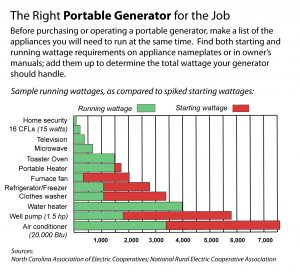If you’re part of the estimated 12 percent of Americans who own a portable generator, you know it can be valuable if the power goes out. But did you know generators can be dangerous to those working to restore power?
Our line crews take all of the necessary precautions before beginning work on downed power lines, but a generator connected to a home’s wiring or plugged into a regular household outlet can cause backfeeding (electricity flowing back into the power lines and grid) along power lines and electrocute anyone who comes in contact with them—even if the line appears dead.
CAEC employees and other line workers are not the only ones in danger when a portable generator is used improperly. Generator owners themselves may be at risk of electrocution, fire injury, property damage or carbon monoxide poisoning if safety guidelines such as these are not followed:
- Never connect a generator directly to your home’s wiring unless the home has been wired for generator use. This can cause backfeeding along power lines and electrocute anyone coming in contact with the generator. Have a licensed electrician install the equipment necessary to safely connect emergency generators.
- Always plug appliances directly into generators. Connecting the generator to a home’s circuits or wiring must be done by a qualified, licensed electrician who will install a transfer switch to prevent backfeeding.
- Use heavy-duty, outdoor-rated extension cords free of cuts or tears and be sure that the plug has three prongs. Overloaded cords can cause fires or equipment damage.
- Never overload a generator. A portable generator
should only be used when necessary to power essential equipment or appliances. Look at the labels on lighting, appliances and equipment to determine the amount of power needed to operate the equipment. - Turn off all equipment powered by the generator before shutting it down.
- Keep the generator dry on a dry surface under an open structure.
- Never fuel a generator while it is operating.
- Read and adhere to the manufacturer’s instructions for safe operation. Never cut corners when it comes to safety and always have a fully charged fire extinguisher nearby.
We encourage you to protect the well-being and safety of your family during outages, and safeguard those who come to your aid during power restoration.
